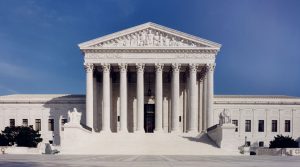Circuit courts have split on whether gender identity and sexual orientation are protected by Title VII of the Civil Rights Act of 1964, as have the Trump Department of Justice (DOJ) and the Equal Employment Opportunity Commission (EEOC). The commission maintains Title VII’s protections based on “sex” include gender identity and sexual orientation, while the DOJ hews to a strict interpretation of “the ordinary meaning of sex,” i.e., male and female.

The U.S. Supreme Court will hear three cases on LGBT rights
The Supreme Court today agreed to take up three circuit court cases that address the issue in different ways. For instance, the 2nd U.S. Circuit Court of Appeals has ruled that Title VII does indeed protect sexual orientation, while the 11th circuit has ruled the opposite — there is no protection for sexual orientation. The 11th circuit court somehow managed to find a middle ground.
Now, it’s the Supreme Court’s turn to resolve the issue one way or the other. The hearing will not be held until the fall, however, meaning the decision likely won’t come before June 2020, the height of the electioneering season.
For employers in 20 states where laws already cover protections for the LGBTQ community, the court’s decision will likely have little bearing. And employers in the other states have been advised by lawyers to act as if anti-discrimination protections are already in place.
The three cases are Bostock v. Clayton County, Georgia; Altitude Express, Inc., et al. v. Zarda, Melissa, et al. and R.G. & G.R. Harris Funeral Homes v. EEOC, et al.
